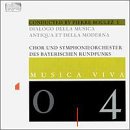| All Artists: Heinz Rehfuss, Claude Debussy, Igor Stravinsky, Flemish Anonymous, Olivier Messiaen, Bela Bartok, Pierre Boulez, Jeanne Deroubaix, Bavarian Radio Symphony Orchestra, Bayerischen Rundfunkorchester, Yvonne Loriod, Eva Maria Rogner, Lorenz Fehenberger Title: Musica Viva Members Wishing: 0 Total Copies: 0 Label: Col Legno Release Date: 8/29/2000 Album Type: Import Genre: Classical Styles: Opera & Classical Vocal, Chamber Music, Forms & Genres, Theatrical, Incidental & Program Music, Historical Periods, Early Music Number of Discs: 2 SwapaCD Credits: 2 UPC: 675754245924 |
Search - Heinz Rehfuss, Claude Debussy, Igor Stravinsky :: Musica Viva
 | Heinz Rehfuss, Claude Debussy, Igor Stravinsky Musica Viva Genre: Classical
|
Larger Image |
CD Details |
CD ReviewsBe Ready To Take Notes The Aeolian | 08/21/2007 (4 out of 5 stars) "There is a whiff of the seminar about this set: four works for voices and orchestra and one work for piano and small orchestra with an ecclesiastical thread running through them which is snipped at the last piece, Bartok's Cantata Profana. The title sets the tone: "A Dialogue Between Music Ancient and Modern." So, you see, here is how certain ideas set to music were treated in medieval times, then the 19th century, and then the "modern" era: from a society steeped in religion to a the world as seen from a rigorously secular point of view. A (rhetorical) "dialogue" between the texts, the composers, and the various supposed audiences for these works is posited. All that is missing is a DVD of Boulez at a blackboard (these are archival recordings, so no Power Point) diagramming the various developments and relationships to be discerned.
The music is mostly engaging, with or without the intellectual construct. There is a vibrant and idiomatic performance of one of Debussy's lesser-performed works. The Messiaen is on the edgy side, sometimes provoking a wish to get away from those birds, but boring it is not. Bartok's Cantata is sung in German in a well-focused reading with Boulez's usual clarity of texture. Compared with Boulez's recording of the same work 27 years later for Deutsche Grammophon this is a more brisk, austere approach--the DG recording is almost a minute longer, notable in a work which is fairly brief. Could singing the work in the original Hungarian have added that much time? But even Boulez's later recording is fleet compared to Robert Shaw's approach to the same work (no surprise there). As for the Messe de Tournai, who knows? It is the starting point of The Thesis, it is medieval, and for all that it sounds just fine. Then there is a work which was new at the time of recording: The Flood, Stravinsky's exercise in spiky serialism for chorus and narrator, with every sequence and relationship carefully delineated, sung in English with narration in German, an experience that once heard is not soon forgotten. The recordings were done in two concerts for German radio in 1960 and 1964, and seem to have been attentively remastered. The result is always listenable, if not lush. One recording flaw is a tendency towards diffuseness, which can render the choral passages as a string of airy syllables at times. This set offers Boulez as a conductor in an earlier period than is usually found in the catalog of recordings, and for that alone it is of interest. All in all, this is a stimulating collection which is buoyed by the performance of the Debussy." |

 Track Listings (17) - Disc #1
Track Listings (17) - Disc #1